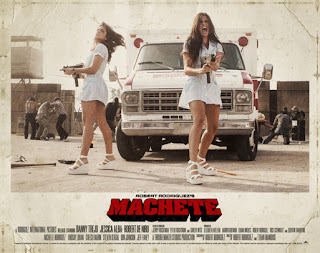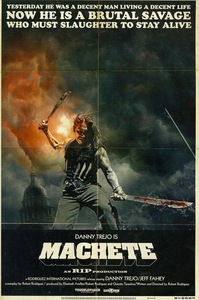 |
| Machete |
This is a cross post from Heroine Content.
Trigger warning here for a joke from the movie concerning sexual assault, which is mentioned briefly at the end of this post.)
Ah, Machete. What I remember best about Machete, unfortunately, is the phone call I got as the credits started to roll. It was my mother in law, telling me my three year old had fallen off a love seat onto a tile floor, landing on his head, and now he was saying his head was buzzing and his tongue felt funny. Everything turned out okay, but now Danny Trejo will likely always be linked for me with my son’s possible concussion and the Dell Children’s emergency room. It’s a shame, because I really like him. If I could re-link that memory to Jessica Alba, I would, but after Fantastic Four that there just isn’t room for more Jessica Alba pain associations in my neural pathways.
Before all of that excitement, though, I’m pretty sure I saw a film that included two things.
First, I saw multiple people of color, including women, as the forces of good in an action film about the concerns of hardworking, decent people who just happen to be one of the most villanized groups in my home state of Texas – Mexicans and Mexican-Americans! In this film, these people are the real heroes, and for a lovely change of pace in media, the U.S. is portrayed with just as much corruption as Mexico, if not moreso because of all the hypocrisy.
I thoroughly enjoyed this aspect of the film, especially when Team Good got to kick major ass.
(This is where some drive-by commenter is going to come along and be all “are you really anti-racist or are you just against white people?” just like happened on my review of Batman Returns. I’m not sure why people do the drive-bys. Do they think I’m going to be struck by the insightfulness of their observations and get therapy to resolve my virulent anti-white-people agenda?)
Unfortunately, in addition to the righteous ass-kicking by people of color for great justice, the second thing I saw while watching Machete was a film that ruthlessly exploited women for the glorification of a male action hero and the satisfaction of the male gaze, and it was really fucking disappointing.
To get this across better, let’s take a look at the nurses:
 |
| The nurses |
Electra Avellan and Elise Avellan play the nurses, and I love them. They work in a hospital for The Network, an underground resistance movement that assists Mexicans who immigrate into Texas. I’m not sure they have any medical skills, as their main responsibility in caring for the wounded Machete seems to be comforting him with eye candy, but they are on the side of good and they wear fantastic platform heels and shoot things and I have absolutely no problem with any of that. If sexy nurses with machine guns can’t be part of your revolution, then I don’t want any.
(That’s not what you thought I was going to say, was it?)
In a feminist utopia I think the nurses could still exist in a movie, because I think there are a lot of women who would find that a lot of fun, and for good reasons. When Grace reviewed Grindhouse, which included Robert Rodriguez’s Planet Terror, she said this:
…the whole package pays homage to/makes fun of the “grindhouse,” which is a beaten-down movie theater that plays double-bills of B movies. […] Now that we’re clear that these are supposed to be B movies, that they are hearkening back to and a parody of a specific kind of film, then we can skip all of the ways in which they are typically sexist. Yes, there are copious bare breasts and ass shots, women are called bitch all over the place, sexual violence is threatened (though, and I thought this was telling, never actually enacted) […] If there is any chance of you enjoying Grindhouse, or finding anything about it to be subversive or interesting, you are going to have to consider these things part of the kitsch that Rodriguez and Tarantino are playing with and move on.
To me, the nurses are part of that kitsch. They’re a lighthearted genre trapping. What I DO have a problem with is that almost every other woman with a speaking part in this movie is basically the exact same character as the nurses, just in different clothes. They exist to fawn over the hero, look hot for the audience, and kick ass, without any distracting personal goals or motivations.
From the naked woman who betrays Machete and stabs him in the leg with his own knife to win a drug lord’s favor, to Jessica Alba’s ambitious INS agent whose career ambitions are quickly sacrificed to furthering his quest, to Cheryl Chin’s turn as the Dragon Lady enforcer for the drug lord, to Lindsay Lohan’s drugged out, often naked internet porn star (who gets used sexually by Machete to humiliate her father, in a plotline I thought was beyond atrocious), there there is barely a hint of any female activity that does not revolve around men. Michelle Rodriguez’s Luz comes close, but even she is ready to turn over leadership to Machete as quickly as possible, anointing him leader of her desired revolution. (For all Rodriguez’s talk in the media lately about how she wants to be typecast as the bad-ass instead of the boring girlfriend, I was expecting a little more.) Alba and Rodriguez even get new costumes late in the movie to make them fit better into the nurse paradigm, and the results are not awesome.
Lately I’ve been reading some of the Criminal comic book series by Ed Brubaker and Sean Phillips, and it’s gotten me thinking about women in genre fiction. Criminal is specifically noir crime fiction, and when you read that kind of fiction, you know from the get-go that the dame is going to be trouble. I would argue that action movies are almost as bad for prescribing the roles female characters must play, and B movies doubly so. So if you’re going to create in a genre like that, how do you work with your female characters in a way that’s not horribly sexist? How do you give them agency? How do you give them personalities and missions in their lives beyond their usefulness as plot points for the hero?
Let me tell you, the people who made Machete haven’t asked themselves any of those questions. Or if they have, they’re doing it wrong. “All your babes are belong to our sexy stereotype” is not creating strong female characters, regardless of how many guns you give them. Turning all women into genrelicious Barbie is not staying within the genre, it’s turning them into objects. You could argue that the men in this film are also stereotypes, but damn, at least they get to have clothes on!
I desperately want to give this film some stars. The way the film treats women, though, is appalling. The rape joke made by Machete’s brother when Machete brings two drugged, naked women to his church was also not okay.
No stars.
Skye Kilaen blogs about women kicking ass in action films at Heroine Content, where the unofficial slogan is “Helping feminists with their Netflix queues since 2006.”
